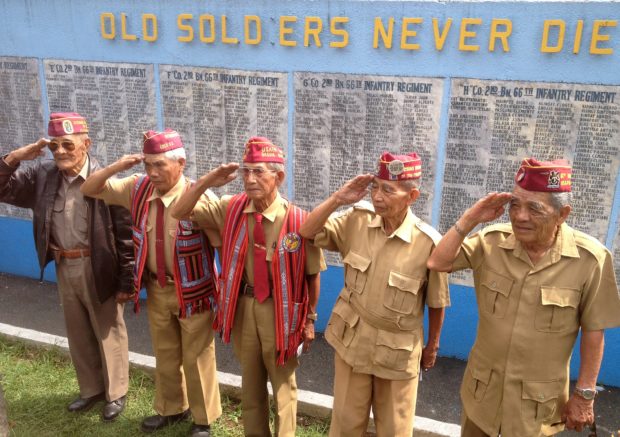Kin of WWII veterans eye project telling ‘the stories of our fathers’

A Wall of Valor at the Baguio Veterans Park lists the names of Filipino soldiers and guerrillas who resisted the Japanese occupation from 1942 to 1945, including these war veterans. (File photo by VINCENT CABREZA / Inquirer Northern Luzon)
MANILA, Philippines — As the number of World War II (WWII) veterans continues to dwindle, their children and grandchildren, with the help of history advocates, are racing against time to add their own, more intimate way of retelling their parents’ and grandparents’ experiences as a document they can pass on to the next generation.
Mike Villa-Real, executive vice president of the Veterans Federation of the Philippines-Sons and Daughters Association Inc., said there were still a lot of stories of courage, love, and horror — or even comedy — that can be mined and shared from that dark period.
“These are first-hand stories and I [thought] it’s a waste because we weren’t able to pass on the stories from real veterans,’” Villa-Real said in a media forum on Dec. 7, the 81st anniversary of the Japanese attack on Pearl Harbor that brought the war to the Pacific. (The Japanese invasion of the Philippines commenced hours later on Dec. 8, 1941.)
Life and death choices
He said his association, if it is to add to the books and documentaries already produced about WWII in the Philippines, would like to emphasize that the veterans were just ordinary people who had to make “key decisions” for themselves and their families during the war.
“Will I just simply be part of what is now the leadership (invaders), be part of the government? Or will I fight, defend and preserve what will become our nation of Filipinos?” said Villa-Real, one of the guests at the Pandesal Forum in Quezon City on Wednesday.
Article continues after this advertisement“Many of them decided to do the latter and those are the stories that we want to broadcast as [their] sons and daughters: The stories of our fathers,” he added.
Article continues after this advertisementVilla-Real pointed out that the Philippines, as the Japanese advanced across Asia, mounted the longest resistance in the region, with Filipino and American forces making their last stand in Bataan and Corregidor at a time when Indonesia, Singapore and Malaysia had already surrendered.
The Death March
Regarding the infamous Death March, the hellish relocation of about 66,000 Filipino and 10,000 American prisoners of war (POWs) from Mariveles, Bataan, to Capas, Tarlac, Villa-Real said “that route is very important to the families, that’s why we want to preserve it.’’
“Many died along the route, some [of the sick and wounded] had to walk slowly while the others were killed [by the Japanese] instead of being carried,” Villa-Real said.
Death March stories were later told not just by the survivors themselves but by the civilians who witnessed it, he added.
Grateful POW
One account that struck him, he said, was from a survivor who, as his condition got worse during the march, thought of just falling by the wayside and abandoning his fate to the Japanese bayonets, thinking “he would end up dead, anyway.”
But that POW eventually made it alive thanks to two fellow captives who helped him walk and told him “we can do it.” “When they arrived in Capas, one of his friends died of sickness. Meanwhile, the guy lived and had a family after the war,” Villa-Real said.
That particular veteran “kept on remembering that person” to whom he owed his life, ever grateful for helping him and keeping his hopes up through the March.
These are the kinds of narratives the Sons and Daughters would like to highlight, perhaps in the form of “short stories” intended for students, he said.
Pasig City Rep. Roman Romulo, who was also a guest at the media forum, said such objectives jibed with his House Bill No. 5719, which seeks to further integrate WWII history—from the Filipino viewpoint—into the college curriculum.
The effort would require a collaboration among the Commission on Higher Education, the Philippine Veterans Affairs Office, and the National Historical Commission of the Philippines, Romulo said.